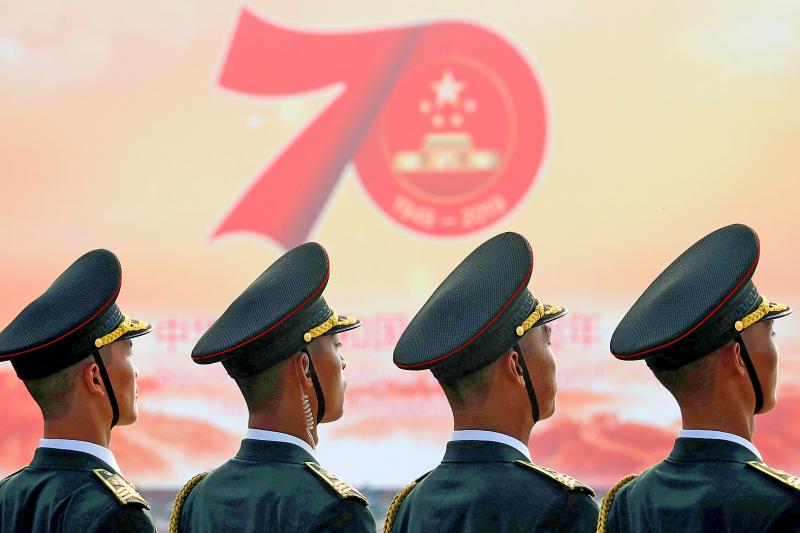Urgent measures are needed to strengthen the credibility of US military deterrence of any potential Chinese aggression against Taiwan, a report released on Wednesday by a bipartisan advisory body to the US Congress said.
The US-China Economic and Security Review Commission included a range of recommendations about Taiwan in its annual report to Congress, amid heightened tensions between Taiwan and China.
Congress should take either legislative or administrative action to “resist any resort to force that would jeopardize the security of Taiwan” in accordance with the US’ Taiwan Relations Act, it said.

Photo: Reuters
Congress should authorize and appropriate funds for Taiwan to purchase defense articles from the US and finance the deployment of cruise and ballistic missiles and other munitions in the Indo-Pacific region, while increasing funding for surveillance, it said.
“A lack of clarity in US policy could contribute to a deterrence failure if Chinese leaders interpret that policy to mean opportunistic aggression against Taiwan might not provoke a quick or decisive US response,” the report added.
Chinese Communist Party (CCP) leaders remain deeply concerned about the uncertain success of an attempted invasion against Taiwan because failed attempts by the Chinese People’s Liberation Army (PLA) “to invade Taiwan or to counter US intervention risk undermining the CCP’s legitimacy,” it said.
However, the report said that Beijing’s “increasingly coercive approach to Taiwan puts almost daily pressure on the cross-strait status quo and increases the potential for a military crisis.”
The PLA “has already achieved the capabilities needed to conduct an air and naval blockade, cyberattacks and missile strikes against Taiwan,” the report said, estimating that it could at present carry an initial landing of 25,000 or more troops on Taiwan.
Under these circumstances, it has become less certain that US conventional military forces alone would continue to deter China’s leaders from initiating an attack on Taiwan, it said.
The report also addressed a range of economic issues between the US and China, including recommending that Congress consider legislation to address risks to US investors and interests in China investment.
China’s capital controls “may limit investors’ abilities to move money out of equity and bond investments, and the lack of oversight by trusted authorities may jeopardize investors’ funds,” commission chairwoman Robin Cleveland said in an opening statement. “More importantly, numerous companies which will benefit from US investment have been formally identified as threats to US national security interests.”
The report recommends prohibiting or at least better identifying the risks of variable interest entities, where Chinese companies create offshore corporate entities to circumvent China’s prohibitions on foreign direct investment in certain industries and list on US exchanges.
The report said that US participation in China’s financial markets was increasing — reaching as much as US$1.2 trillion last year — and “outpacing the US government’s defense” against threats posed by problematic Chinese companies.
The US administration has prohibited investment in 24 publicly traded Chinese companies, but commissioners Jeffrey Feidler and Michael Wessel said that “many more should be on the list.”
Additional reporting by CNA

US President Donald Trump yesterday announced sweeping "reciprocal tariffs" on US trading partners, including a 32 percent tax on goods from Taiwan that is set to take effect on Wednesday. At a Rose Garden event, Trump declared a 10 percent baseline tax on imports from all countries, with the White House saying it would take effect on Saturday. Countries with larger trade surpluses with the US would face higher duties beginning on Wednesday, including Taiwan (32 percent), China (34 percent), Japan (24 percent), South Korea (25 percent), Vietnam (46 percent) and Thailand (36 percent). Canada and Mexico, the two largest US trading

AIR SUPPORT: The Ministry of National Defense thanked the US for the delivery, adding that it was an indicator of the White House’s commitment to the Taiwan Relations Act Deputy Minister of National Defense Po Horng-huei (柏鴻輝) and Representative to the US Alexander Yui on Friday attended a delivery ceremony for the first of Taiwan’s long-awaited 66 F-16C/D Block 70 jets at a Lockheed Martin Corp factory in Greenville, South Carolina. “We are so proud to be the global home of the F-16 and to support Taiwan’s air defense capabilities,” US Representative William Timmons wrote on X, alongside a photograph of Taiwanese and US officials at the event. The F-16C/D Block 70 jets Taiwan ordered have the same capabilities as aircraft that had been upgraded to F-16Vs. The batch of Lockheed Martin

GRIDLOCK: The National Fire Agency’s Special Search and Rescue team is on standby to travel to the countries to help out with the rescue effort A powerful earthquake rocked Myanmar and neighboring Thailand yesterday, killing at least three people in Bangkok and burying dozens when a high-rise building under construction collapsed. Footage shared on social media from Myanmar’s second-largest city showed widespread destruction, raising fears that many were trapped under the rubble or killed. The magnitude 7.7 earthquake, with an epicenter near Mandalay in Myanmar, struck at midday and was followed by a strong magnitude 6.4 aftershock. The extent of death, injury and destruction — especially in Myanmar, which is embroiled in a civil war and where information is tightly controlled at the best of times —

China's military today said it began joint army, navy and rocket force exercises around Taiwan to "serve as a stern warning and powerful deterrent against Taiwanese independence," calling President William Lai (賴清德) a "parasite." The exercises come after Lai called Beijing a "foreign hostile force" last month. More than 10 Chinese military ships approached close to Taiwan's 24 nautical mile (44.4km) contiguous zone this morning and Taiwan sent its own warships to respond, two senior Taiwanese officials said. Taiwan has not yet detected any live fire by the Chinese military so far, one of the officials said. The drills took place after US Secretary